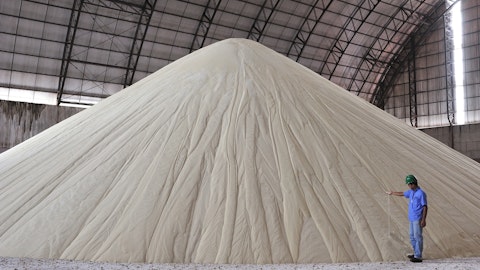Steve Hansen: Okay. Fair enough. And then just lastly around capital allocation. You’ve got a good cash position here to finish off G3, when should we start to think about sort of like the next stage of capital allocation in terms of comfortability on accelerating the buyback or pursuing the buy back more aggressively as the cash flow opportunities are set to ?
Rich Sumner: Yes, so we’re really happy with where we are today. Our balance sheet is in really good position with about $800 million on the balance sheet with $465 million left to spend on G3 and we’re maintaining our minimum cash balances at $300 million. So we don’t see a lot of excess today. We will be generating at today’s methanol prices with our assets operating — generating strong cash flow. We’re obviously going to be cautiously watching things and still moving through a period of economic uncertainty here. But we have options for excess cash. So like you said, we can accelerate the current bid, it’s still around over $100 million at today’s share price. That number is getting bigger every day. And then if we can upsize the bid as well, which would mean going to 10% of the public float would be another around $100 million.
And then we’ve said that we want to repay rather than refinance our $300 million bond coming due in 2024 and we think we can do that in stages rather than all at once. So we have options, we’re going to be looking at our options and obviously first priority is to keep a strong balance sheet and through this period and ensure G3 is completed
Steve Hansen: Thank you for the time. Thanks.
Operator: Your next question comes from the line of Jacob Bout with CIBC. Please go ahead.
Jacob Bout: Good morning.
Rich Sumner: Hey Jacob.
Jacob Bout: Yes, I wanted to go back to that discussion on China and your thoughts on the low MTO affordability that we’re dealing with right now. One, does that improve, because I thought part of the discussion, there was just the overcapacity situation wins for the Chinese olefins market given the ramp and new capacity there?
Rich Sumner: Yes, so the olefins market has been under pressure for well over a year. That’s on the back of both like you said the new capacity that’s been coming into the market, as well as the economic demand for olefins. So kind of a double whammy there. That’s impacted the affordability for both Asian naphtha producers as well as MTO. We think MTO, it’s been competitive to naphtha through that period. But it’s been tough for all producers in that sector. When it gets back into balance. It’s sort of hard to predict. We think that that — on the demand side, certainly the opening up of China could help support on the demand, but there is new capacity and required rationalization of operating rates. We don’t really think, olefins pricing is so low right now, it’s low-low.
It’s hard to see it going further down from here, but we’ll see how — see what happens. So, we think there is some positive signs with demand that could help balance things out, but still need that rationalization in that industry.
Jacob Bout: Okay. And then my second question just on the Trinidad gas contract. Maybe just talk through where you are in the negotiations are for Titan. And this contract for Atlas, will you be doing this at the same time? And then what are the structures of the gas contracts being considered?





